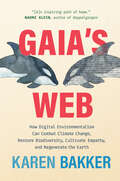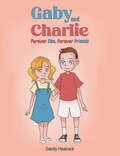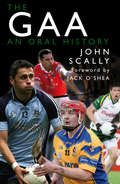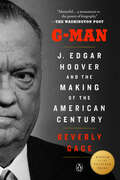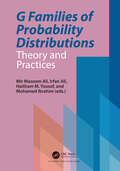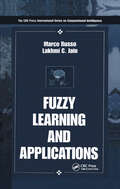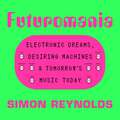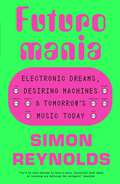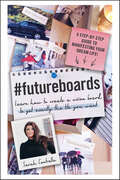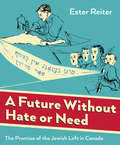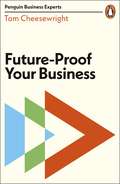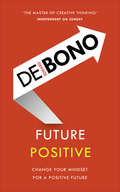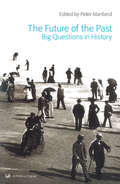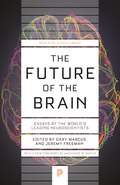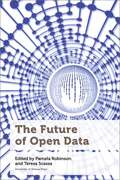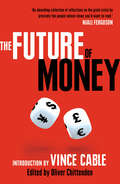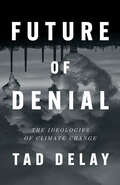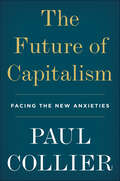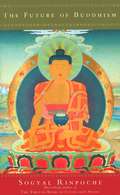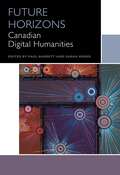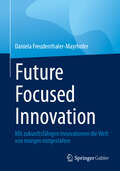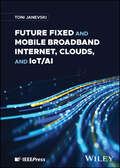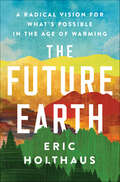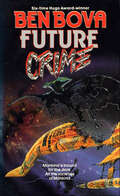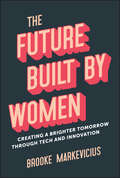- Table View
- List View
Gaia's Web: How Digital Environmentalism Can Combat Climate Change, Restore Biodiversity, Cultivate Empathy, and Regenerate the Earth
by Karen BakkerA riveting exploration of one of the most important dilemmas of our time: will digital technology accelerate environmental degradation, or could it play a role in ecological regeneration?At the uncanny edge of the scientific frontier, Gaia&’s Web explores the promise and pitfalls the Digital Age holds for the future of our planet. Instead of the Internet of Things, environmental scientist and tech entrepreneur Karen Bakker asks, why not consider the Internet of Living Things? At the surprising and inspiring confluence of our digital and ecological futures, Bakker explores how the tools of the Digital Age could be mobilized to address our most pressing environmental challenges, from climate change to biodiversity loss. Interspersed with ten elegiac, enigmatic parables, each of which is based on an existing technology, Gaia&’s Web evokes the conundrums we face as the World Wide Web intertwines with the Web of Life.A new generation of innovators is deploying digital technology to come to the aid of the planet, using spy satellites to track down environmental criminals, inviting animals to the Metaverse, and biohacking Frankenstein-like biobots as environmental sentinels. But will they end up doing more harm than good? In an engaging take on conservation technology, Bakker looks at the digital tech applications to environmental issues from predatory harvesting of environmental data to human bycatch and eco-surveillance capitalism. If we address these issues and mobilize digitally mediated forms of citizen science, she argues, digital tech could help reverse environmental harms and advance environmental sustainability. And in the process, Big Tech might be transformed for the better.With its uniquely broad scope—combining insights from computer science, ecology, engineering, environmental science, and environmental law—Gaia&’s Web introduces profoundly novel ways of addressing our most pressing environmental challenges—mitigating climate change, protecting endangered species—and creating new possibilities for ecological justice by empowering nonhumans to participate in environmental regulation.
Gaby and Charlie Forever Sibs, Forever Friends
by Sandy HeacockThis a story about a brother named Gabe and sister named Charlie, who, although they’re related, are also friends forever! Gaby and Charlie have different interest and likes. They don’t always get along but when it comes to helping each other, they’re always there for each other, no matter what!
The GAA: An Oral History
by John ScallyFor 125 years, the GAA has been a fixed point in a fast-changing age, and this oral history marks the125th anniversary of the Association. It is the story of the GAA as seen through the eyes of those key personalities who shaped it. Author Jon Scally has carried out over a hundred revealing interviews with players and managers who are synonymous with the Games, including Babs Keating, Jimmy Barry-Murphy, Ger Loughnane, D.J. Carey, Liam Griffin, Mick O'Dwyer, Colm O'Rourke, John O'Mahony, Joe Brolly and Matt Connor, and these contributions offer a unique eyewitness testimony to the dramas that captivated, enthralled and occasionally infuriated the nation both on and off the pitch. The book sheds new light on high-profile controversies, offers new insights into the players and personalities that linger long in the memory and presents a fresh look at the epic contests that turned Ireland's Games into a national soap opera.The GAA: An Oral History is a celebration of the good, the bad and the beautiful of Gaelic Games, and is a must for all sports fans.
G-Man (Pulitzer Prize Winner): J. Edgar Hoover and the Making of the American Century
by Beverly GageWinner of the 2023 Pulitzer Prize in BiographyWinner of the 2022 National Book Critics Circle Award in Biography, the 2023 Bancroft Prize in American History and Diplomacy, and the 43rd LA Times Book Prize in Biography | Finalist for the 2023 PEN/Jacqueline Bograd Weld Award for BiographyNamed a Best Book of 2022 by The Atlantic, The Washington Post and Smithsonian Magazine and a New York Times Top 100 Notable Books of 2022 &“Masterful…This book is an enduring, formidable accomplishment, a monument to the power of biography [that] now becomes the definitive work&”—The Washington Post&“A nuanced portrait in a league with the best of Ron Chernow and David McCullough.&”—The Wall Street JournalA major new biography of J Edgar Hoover that draws from never-before-seen sources to create a groundbreaking portrait of a colossus who dominated half a century of American history and planted the seeds for much of today's conservative political landscape.We remember him as a bulldog--squat frame, bulging wide-set eyes, fearsome jowls--but in 1924, when he became director of the FBI, he had been the trim, dazzling wunderkind of the administrative state, buzzing with energy and big ideas for reform. He transformed a failing law-enforcement backwater, riddled with scandal, into a modern machine. He believed in the power of the federal government to do great things for the nation and its citizens. He also believed that certain people--many of them communists or racial minorities or both-- did not deserve to be included in that American project. Hoover rose to power and then stayed there, decade after decade, using the tools of state to create a personal fiefdom unrivaled in U.S. history. Beverly Gage&’s monumental work explores the full sweep of Hoover&’s life and career, from his birth in 1895 to a modest Washington civil-service family through his death in 1972. In her nuanced and definitive portrait, Gage shows how Hoover was more than a one-dimensional tyrant and schemer who strong-armed the rest of the country into submission. As FBI director from 1924 through his death in 1972, he was a confidant, counselor, and adversary to eight U.S. presidents, four Republicans and four Democrats. Franklin Roosevelt and Lyndon Johnson did the most to empower him, yet his closest friend among the eight was fellow anticommunist warrior Richard Nixon. Hoover was not above blackmail and intimidation, but he also embodied conservative values ranging from anticommunism to white supremacy to a crusading and politicized interpretation of Christianity. This garnered him the admiration of millions of Americans. He stayed in office for so long because many people, from the highest reaches of government down to the grassroots, wanted him there and supported what he was doing, thus creating the template that the political right has followed to transform its party.G-Man places Hoover back where he once stood in American political history--not at the fringes, but at the center--and uses his story to explain the trajectories of governance, policing, race, ideology, political culture, and federal power as they evolved over the course of the 20th century.
G Families of Probability Distributions: Theory and Practices
by Mir Masoom Ali Irfan Ali Haitham M. Yousof Mohamed IbrahimStatistical distributions are essential tools to model the characteristics of datasets, such as right or left skewness, bi-modality or multi-modality observed in different applied sciences, such as engineering, medicine, and finance. The well-known distributions like normal, Weibull, gamma and Lindley are extensively used because of their simple forms and identifiability properties. In the last decade, researchers have focused on the more complex and flexible distributions, referred to as Generalized or simply G families of probability distributions, to increase the modelling capability of these distributions by adding one or more shape parameters.The main aim of this edited book is to present new contributions by researchers in the field of G families of probability distributions. The book will help researchers to: Develop new univariate continuous and discrete G families of probability distributions. Develop new bivariate continuous and discrete G families of probability distributions. Derive beneficial mathematical properties such as ordinary and incomplete moments, moment generating functions, residual life and reversed residual life functions, order statistics, quantile spread ordering and entropies, and some bivariate and multivariate extensions of the new and existing models using a simple-type copula.
Fuzzy Learning and Applications (International Series on Computational Intelligence)
by Marco RussoWith low computational complexity and relatively short development time, Fuzzy Logic is an indispensable tool for engineering applications. The field is growing at an unprecedented rate, and there is a need for a book that describes essential tools, applications, examples, and perspectives in the field of fuzzy learning. The editors of Fuzzy Learni
Futuromania: Electronic Dreams, Desiring Machines and Tomorrow’s Music Today
by Simon ReynoldsSimon Reynolds's first book in eight years is a celebration of music that feels like a taste of tomorrow. Sounds that prefigure pop music's future - the vanguard genres and heroic innovators whose discoveries eventually get accepted by the wider mass audience. But it's also about the way music can stir anticipation for a thrillingly transformed world just around the corner: a future that might be utopian or dystopian, but at least will be radically changed and exhilaratingly other. Starting with an extraordinary chapter on Giorgio Moroder and Donna Summer, taking in illuminating profiles of Ryuichi Sakamoto, Boards of Canada, Burial, and Daft Punk, and arguing for Auto-Tune as the defining sound of 21st century pop, Futuromania shapes over two-dozen essays and interviews into a chronological narrative of machine-music from the 1970s to now. Reynolds explores the interface between pop music and science fiction's utopian dreams and nightmare visions, always emphasising the quirky human individuals abusing the technology as much as the era-defining advances in electronic hardware and digital software. A tapestry of the scenes and subcultures that have proliferated in that febrile, sexy and contested space where man meets machine, Futuromania is an enthused listening guide that will propel readers towards adventures in sound. There is a lifetime of electronic listening here.
Futuromania: Electronic Dreams, Desiring Machines and Tomorrow’s Music Today
by Simon ReynoldsSimon Reynolds's first book in eight years is a celebration of music that feels like a taste of tomorrow. Sounds that prefigure pop music's future - the vanguard genres and heroic innovators whose discoveries eventually get accepted by the wider mass audience. But it's also about the way music can stir anticipation for a thrillingly transformed world just around the corner: a future that might be utopian or dystopian, but at least will be radically changed and exhilaratingly other. Starting with an extraordinary chapter on Giorgio Moroder and Donna Summer, taking in illuminating profiles of Ryuichi Sakamoto, Boards of Canada, Burial, and Daft Punk, and arguing for Auto-Tune as the defining sound of 21st century pop, Futuromania shapes over two-dozen essays and interviews into a chronological narrative of machine-music from the 1970s to now. Reynolds explores the interface between pop music and science fiction's utopian dreams and nightmare visions, always emphasising the quirky human individuals abusing the technology as much as the era-defining advances in electronic hardware and digital software. A tapestry of the scenes and subcultures that have proliferated in that febrile, sexy and contested space where man meets machine, Futuromania is an enthused listening guide that will propel readers towards adventures in sound. There is a lifetime of electronic listening here.
#FutureBoards: Learn How to Create a Vision Board to Get Exactly the Life You Want
by Sarah CentrellaLearn to create the ultimate vision board to actualize the life you want with this essential guide!A #FutureBoard takes the idea of a vision board one step further—it&’s a true visual representation of your desired future life. When utilized correctly, it can be a great tool to help you to turn your dreams into reality—and this book shows you how to do exactly that.#FutureBoards explains how to identify and create your ideal future with intention, and shows you step-by-step how to create a fabulous board worthy of your wildest dreams and so you can use it to upgrade your entire life.Get ready to make the life you&’re dreaming about a reality with your very own #FutureBoard!
A Future Without Hate or Need: The Promise of the Jewish Left in Canada
by Ester ReiterDriven from their homes in Russia, Poland, and Romania by pogroms and poverty, many Jews who came to Canada in the wave of immigration after the 1905 Russian revolution were committed radicals. A Future Without Hate or Need brings to life the rich and multi-layered lives of a dissident political community, their shared experiences and community-building cultural projects, as they attempted to weave together their ethnic particularity—their identity as Jews—with their internationalist class politics.
Future-Proof Your Business (Penguin Business Experts Series)
by Tom CheesewrightIt has never been more important for business leaders to look to the future. Yet, when we are living through some of the most uncertain times we have ever faced, it can feel daunting to know where to start. In Future-Proof Your Business, applied futurist Tom Cheesewright will reveal industry techniques and tools to help you: - Scan the near horizon for incoming shocks- Look to the far future to define long-term strategy- Accelerate decision-making in your business- Delegate power to the front line, speeding your response- Streamline your organisation so it's agile and can adapt to changeIn our uncertain times, leaders who keep their focus on the future will be the ones who prevail.
Future Positive
by Edward de Bono‘Of one thing in life we can be sure. The quality of our life in the future will depend on the quality of our thinking.’Why are we so prone to be negative? And how can we become more positive, both as individuals and as a society? The answer lies in the way we think. The key to positive thinking is developing new concepts, whether this means coming up with a brand new idea or just looking at an existing one in a new light. If we make a deliberate and positive effort to change our thinking we can secure a positive future, and we can harness the focused power of human thinking by releasing it from its pettiness. Edward the Bono is the Nobel Prize nominated father of creative thinking and the master of training the mind to think the right way. He wrote the multi-million copy bestseller Six Thinking Hats and many other revolutionary works on how to think. This classic work was first published in 1979, and since then our belief in the power of positive thinking has only become stronger.
The Future Of The Past: Big Questions in History
by Peter MartlandAt the beginning of the new millennium, The Future of the Past offers a fresh interpretation of the issues and developments that have shaped our world over the last thousand years. By bringing together the expertise of members of the History Faculty at Cambridge University, all of them leaders in their chosen fields, a work of history has been created that is both fascinating and unique. Rather than approaching history as a chain of past events, this book examines some of the key issues facing mankind today and places them into a broad historical context by examining their development throughout the ages. By viewing history through themes such as religious authority, civil liberty, political ideology, demographic change and economic cycles, The Future of the Past challenges many long-held beliefs and enables the reader to reflect upon the dramatic changes of the past and the challenges of the future. As Europe reshapes itself, the question of how it was defined in the past comes to the fore; as Britain experiences devolution, its historical contours and identity are being probed afresh; as the influence of the United States steadily extends across the globe, it compels a reappraisal of the history and responsiveness of Western intellectual, cultural and political traditions. By exploring these issues, The Future of the Past provides an authoritative yet accessible introduction to the study of history and demonstrates how the changing present can revitalize our views of the past.
The Future of the Brain: Essays by the World's Leading Neuroscientists (Princeton Science Library #146)
by Gary Marcus and Jeremy FreemanThe world's top experts take readers to the very frontiers of brain scienceIncludes a chapter by 2014 Nobel laureates May-Britt Moser and Edvard MoserAn unprecedented look at the quest to unravel the mysteries of the human brain, The Future of the Brain takes readers to the absolute frontiers of science. Original essays by leading researchers such as Christof Koch, George Church, Olaf Sporns, and May-Britt and Edvard Moser describe the spectacular technological advances that will enable us to map the more than eighty-five billion neurons in the brain, as well as the challenges that lie ahead in understanding the anticipated deluge of data and the prospects for building working simulations of the human brain. A must-read for anyone trying to understand ambitious new research programs such as the Obama administration's BRAIN Initiative and the European Union's Human Brain Project, The Future of the Brain sheds light on the breathtaking implications of brain science for medicine, psychiatry, and even human consciousness itself.Contributors include: Misha Ahrens, Ned Block, Matteo Carandini, George Church, John Donoghue, Chris Eliasmith, Simon Fisher, Mike Hawrylycz, Sean Hill, Christof Koch, Leah Krubitzer, Michel Maharbiz, Kevin Mitchell, Edvard Moser, May-Britt Moser, David Poeppel, Krishna Shenoy, Olaf Sporns, Anthony Zador.
The Future of Open Data (Law, Technology, and Media)
by Michael Geist Tenille Brown Haewon Chung Sarah Greene Peter Johnson Elizabeth Judge Tracey Lauriault Ian Parfitt Fernando Perini Claus Rinner Renee Sieber Christine Varga Lisa Ward MatherThe Future of Open Data est issu d’un projet de recherche en partenariat subventionné pendant plusieurs années par le Conseil de recherches en sciences humaines (CRSH) qui vise à explorer les données gouvernementales géospatiales ouvertes dans une perspective interdisciplinaire. Les chercheurs associés à cette subvention ont adopté une perspective critique en sciences sociales basée sur l’impératif voulant que la recherche devrait être pertinente à la fois pour le gouvernement et pour les partenaires de la société civile œuvrant dans ce domaine.Cet ouvrage s’appuie sur les connaissances développées durant la période de validité de la subvention et soulève la question : « Quel est l’avenir des données ouvertes ? » Les collaborateurs partagent leurs idées à propos de l’avenir des données ouvertes à la suite d’observations et de recherches menées pendant cinq ans sur la communauté des données ouvertes canadiennes selon une perspective critique de ce qui pourrait et ce qui devrait arriver dans un contexte où évoluent les efforts concernant les données ouvertes.Chaque chapitre de ce livre aborde une diversité d’enjeux tout en s’appuyant sur des perspectives disciplinaires ou interdisciplinaires. Le premier chapitre retrace les origines des données ouvertes au Canada et la manière dont la situation a évolué jusqu’à aujourd’hui, en tenant compte du croisement entre le mouvement de souveraineté des données autochtones et les données ouvertes. Quelques chapitres se penchent sur certains dangers et sur les possibilités des données ouvertes, à leurs limites et même aux responsabilités qui s’y rattachent. Une autre série de chapitres examine les horizons appropriés pour les données ouvertes, incluant les données ouvertes dans le Sud global, les priorités des gouvernements locaux en matière de données et le contexte émergent des données ouvertes dans les milieux ruraux.
The Future of Money: Introduction by Vince Cable (World Class Thinking on Global Issues #1)
by Oliver ChittendenThe state of the global economy affects every single one of us. With economic growth threatened by financial regulation and the East and West at competitive odds, the real solutions to global recession can only come through international co-operation. Featuring world leaders, Nobel Prize-winning economists, award-winning writers and opinion formers The Future of Money brings together the finest thinking to suggest solutions to this global predicament.
Future of Denial: The Ideologies of Climate Change
by Tad DeLay"Tad DeLay is one of the most important and disquieting theorists of consciousness and politics writing today. His work is indispensable."—China Miéville, author of OctoberCapitalism is an ecocidal engine constantly regenerating climate change denialThe age of denial is over, we are told. Yet emissions continue to rise while gimmicks, graft, and green- washing distract the public from the climate violence suffered by the vulnerable. This timely, interdisciplinary contribution to the environmental humanities draws on the latest climatology, the first shoots of an energy transition, critical theory, Earth&’s paleoclimate history, and trends in border violence to answer the most pressing question of our age: Why do we continue to squander the short time we have left?The symptoms suggest society&’s inability to adjust is profound. Near Portland, militias incapable of accepting that the world is warming respond to a wildfire by hunting for imaginary left-wing arsonists. Europe erects nets in the Aegean Sea to capture migrants fleeing drought and war. An airline claims to be carbon neutral thanks to bogus cheap offsets. Drone strikes hit people living along the aridity line. Yes, Exxon knew as early as the 1970s, but the fundamental physics of carbon dioxide warming the Earth was already understood before the American Civil War.Will capitalists ever voluntarily walk away from hundreds of trillions of dollars in fossil fuels unless they are forced to do so? And, if not, who will apply the necessary pressure?
The Future of Capitalism: Facing the New Anxieties
by Paul CollierBill Gates's Five Books for Summer Reading 2019From world-renowned economist Paul Collier, a candid diagnosis of the failures of capitalism and a pragmatic and realistic vision for how we can repair it.Deep new rifts are tearing apart the fabric of the United States and other Western societies: thriving cities versus rural counties, the highly skilled elite versus the less educated, wealthy versus developing countries. As these divides deepen, we have lost the sense of ethical obligation to others that was crucial to the rise of post-war social democracy. So far these rifts have been answered only by the revivalist ideologies of populism and socialism, leading to the seismic upheavals of Trump, Brexit, and the return of the far-right in Germany. We have heard many critiques of capitalism but no one has laid out a realistic way to fix it, until now.In a passionate and polemical book, celebrated economist Paul Collier outlines brilliantly original and ethical ways of healing these rifts—economic, social and cultural—with the cool head of pragmatism, rather than the fervor of ideological revivalism. He reveals how he has personally lived across these three divides, moving from working-class Sheffield to hyper-competitive Oxford, and working between Britain and Africa, and acknowledges some of the failings of his profession.Drawing on his own solutions as well as ideas from some of the world’s most distinguished social scientists, he shows us how to save capitalism from itself—and free ourselves from the intellectual baggage of the twentieth century.
The Future Of Buddhism
by Sogyal RinpocheIn this fascinating collection of articles, Sogyal Rinpoche, author of The Tibetan Book of Living and Dying, draws on his experience of twenty-five years of teaching in the West. In The Future of Buddhism, he reflects on some of the vital issues facing Buddhism in the modern world, issues such as adaptation, training, integration and the support of the sangha. He highlights the role of mind in health in The Spiritual Heart of Tibetan Medicine, delving into the practices of 'lojong' - training the mind - and meditation, and the ultimate healing that comes through recognizing the nature of mind. Finally, Rinpoche gives advice on how to survive the spiritual path in View and Wrong View and Misunderstandings. For when we follow a spiritual path, it is more important than ever to see through the mind and its delusions, and to know just how misunderstandings can come to dominate our lives.
Future Horizons: Canadian Digital Humanities (Canadian Literature Collection)
by Dean Irvine Kiera Obbard Sandra Djwa Roopika Risam Andrea Zeffiro Deanna Fong M Ryan Fitzpatrick Gregory Betts M Eric Schmaltz Dani Spinosa Klara Du Plessis M David Gaertner M Mark V. Campbell M Jon Saklofske Julia Polyck-O’Neill Kim Martin Rashmeet Kaur Pascale Dangoisse Constance Crompton Michelle Schwartz Katherine McLeod Graham H. Jensen M Allan Cho Sarah Zhang Kendra Cowley Susan Brown Asen IvanovAu fil des vingt et quelques chapitres que compte cet ouvrage, les auteurs explorent le passé, le présent et l’avenir de la recherche, de l’enseignement et de l’expérimentation en sciences humaines numériques au Canada. Ce recueil, qui rassemble les travaux de chercheuses et de chercheurs établis et émergents, présente des initiatives contemporaines dans le domaine des sciences humaines numériques. Celles-ci sont conjuguées à un réexamen de l’héritage légué par ce domaine jusqu’à ce jour et à des discussions sur son potentiel. Future Horizons jette aussi un regard historique sur des projets numériques d’envergure, quoique largement méconnus, qui ont été réalisés au Canada. Future Horizons fait plonger le lecteur dans des projets qui mettent à contribution une vaste gamme d’approches — des jeux numériques aux laboratoires ouverts, des archives sonores à la poésie numérique, des arts visuels à l’analyse textuelle numérique — et qui puisent dans des matériaux canadiens tant historiques que contemporains. Dans leurs essais, les auteurs font voir comment une telle diversité d’approches remet en cause la connaissance en permettant aux chercheurs de poser de nouvelles questions.Ce recueil remet en question l’idée selon laquelle il n’existerait qu’une seule définition des sciences humaines numériques ou une seule identité collective nationale. En observant les interactions du numérique avec la race, l’autochtonie, le genre et la sexualité — sans oublier l’histoire, la poésie et le concept de nation —, Future Horizons propose une vue élargie du travail à l’intersection des sciences humaines numériques et des sciences humaines traditionnelles dans le Canada d’aujourd’hui. Ce livre est publié en anglais.Formats disponibles : couverture souple, PDF accessible et ePub accessible.
Future Focused Innovation: Mit zukunftsfähigen Innovationen die Welt von morgen mitgestalten
by Daniela Freudenthaler-Mayrhofer„Ist unser Unternehmen optimal für zukünftige Entwicklungen aufgestellt?“, „Gelingt es uns, die wesentlichen Transformationen im Umfeld zu erkennen und mitzuprägen?“, „Sind wir fähig, Innovationen für eine noch unbekannte Welt zu entwickeln?“ – diese und ähnliche Fragen beschäftigen Führungskräfte, da sie für die Zukunftsfähigkeit einer Organisation von hoher Relevanz sind.Der Blick in die Zukunft ist ungewiss, herausfordernd und für jedes Unternehmen höchst individuell. Umso offener, positiver und konstruktiver Menschen und Organisationen auf das Morgen blicken, desto größer unsere Handlungsspielräume. Jedes Unternehmen, das den Anspruch stellt, die Zukunft aktiv mitgestalten zu wollen, braucht einen weitblickenden Prozess, der nutzerorientierte Innovationsmodelle um die Entwicklung von Zukunftsbildern erweitert.Das vorliegende Buch bietet einen neuen, zukunftsorientierten Innovationsansatz, der das klassische nutzerorientierte Innovationsmodell fortentwickelt und um die Zukunftsperspektive erweitert. Die Autorin erläutert anschaulich, wie die Auseinandersetzung mit wünschenswerten Zukünften die Innovationsarbeit in Unternehmen wesentlich bereichern kann und stellt ein Modell vor, das bekannte Innovationsprozesse um das Explorieren von Trends, das Formulieren von Visionen und das proaktive Entwickeln von Strategien ergänzt.Ausgewählte Fallbeispiele von Unternehmen zeigen, wie individuell und vielschichtig die Gestaltung der Unternehmenszukunft in der Praxis aussehen kann. Sie dienen damit als Inspiration für den eigenen Umgang in der Innovationsarbeit. Mit Beiträgen von:Barbara BoucekThomas FrauscherMarkus KretschmerChristopher LindingerSandra MagerMartina MaraAndrea MassimianiElisabeth SpitzenbergerPatricia Wiendl-Stark
Future Fixed and Mobile Broadband Internet, Clouds, and IoT/AI
by Toni JanevskiFUTURE FIXED AND MOBILE BROADBAND INTERNET, CLOUDS, AND IoT/AI All-in-one resource on the development of Internet and telecoms worldwide, based on the technological frameworks as defined by the ITU Future Fixed and Mobile Broadband Internet, Clouds, and IoT/AI is a highly comprehensive resource that provides full coverage of existing and future fixed and mobile broadband networks, internet, and telecom and OTT services. This book explains how to perform technical, business, and regulatory analysis for future 5G-Advanced, 6G, WiFi, and optical access. This book also covers optical transport, submarine cable, future satellite broadband, cloud computing, massive and critical IoT and frameworks and use of AI / ML in telecommunications. Topics covered include: Internet technologies, IPv6, QUIC, DNS, IPX, QoS in Internet/IP, cybersecurity, future Internet 2030, Internet governance Future metallic and optical broadband, carrier-grade Ethernet, SD-WAN, OTN, submarine cable, satellite broadband, business and regulation of broadband Future mobile and wireless broadband, 5G-Advanced, 5G/6G spectrum management, 5G Non-Terrestrial Networks, QoS, 6G/IMT-2030, WiFi 7 (802.11.be), mobile business and regulatory aspects Cloud computing architectures and service models, MLaaS, BaaS, future OTT and telecom cloud services, business and regulation of clouds Future voice, future TV, XR/AR/VR, critical IoT/AI services, future OTT services, metaverse, network neutrality, future digital economy and markets Future Fixed and Mobile Broadband Internet, Clouds, and IoT/AI is an essential reference for government officials and regulators, business leaders, engineers, managers, and employees in the telecommunications industry, ICT business professionals, and students in telecommunications.
The Future Earth: A Radical Vision for What's Possible in the Age of Warming
by Eric HolthausThe first hopeful book about climate change, The Future Earth shows readers how to reverse the short- and long-term effects of climate change over the next three decades.The basics of climate science are easy. We know it is entirely human-caused. Which means its solutions will be similarly human-led. In The Future Earth, leading climate change advocate and weather-related journalist Eric Holthaus (“the Rebel Nerd of Meteorology”—Rolling Stone) offers a radical vision of our future, specifically how to reverse the short- and long-term effects of climate change over the next three decades. Anchored by world-class reporting, interviews with futurists, climatologists, biologists, economists, and climate change activists, it shows what the world could look like if we implemented radical solutions on the scale of the crises we face. What could happen if we reduced carbon emissions by 50 percent in the next decade?What could living in a city look like in 2030?How could the world operate in 2040, if the proposed Green New Deal created a 100 percent net carbon-free economy in the United States?This is the book for anyone who feels overwhelmed by the current state of our environment. Hopeful and prophetic, The Future Earth invites us to imagine how we can reverse the effects of climate change in our own lifetime and encourages us to enter a deeper relationship with the earth as conscientious stewards and to re-affirm our commitment to one another in our shared humanity.
Future Crime
by Ben BovaFuture Crime is a collection of six short stories and two novels by reknowned science fiction author Ben Bova!From the Foreword: "Will crime always be with us? Yes, in the sense that every society sets down rules of conduct, and there will be members of every society who are not content to live within those rules. The important question is: How do we deal with such criminals? Execute them? Freeze them for future generations to consider? Or use our best powers to change them into useful, honest citizens? These stories examine some of those possibilities."Future Crime consists of five short stories by Ben Bova--"Vince's Dragon", "Out of Time", "Test in Orbit", "Stars, Won't You Hide Me?", and "Diamond Sam"--and one cowritten with Harlan Ellison, "Brillo". Also included are the short novels Escape! and City of Darkness.At the Publisher's request, this title is being sold without Digital Rights Management Software (DRM) applied.
The Future Built by Women: Creating a Brighter Tomorrow Through Tech and Innovation
by Brooke MarkeviciusOvercome the obstacles in the way of women entrepreneurs and founders In The Future Built by Women, Startup Product Leader of Riveter and veteran keynote speaker, Brooke Markevicius, delivers a compelling guide to entrepreneurship for women. With a particular focus on the technology sector, the author shares her fascinating and relevant experiences as a company founder. She explains the four main factors that contribute to success: grit, education, mindset, and support. In the book, you'll explore strategies for conquering the challenges you encounter in the tech industry and in entrepreneurship. You'll also find: Learn practical ways to take your startup from concept to reality, navigating the complexities of entrepreneurship with confidence. Find out how to become "dangerously skilled" in technology, even if you're not a tech expert. Master the art of leveraging technology for the forces of good as an entrepreneur or intrapreneur. Discover the keys to defining and refining your unique entrepreneurial equation. Unearth your passion, purpose, and the roadmap to your vision. An inspiring and exciting vision of women at the forefront of technological, social, and business change, The Future Built by Women is the engaging resource that managers, executives, founders, entrepreneurs, directors, and other business leaders have been waiting for.
